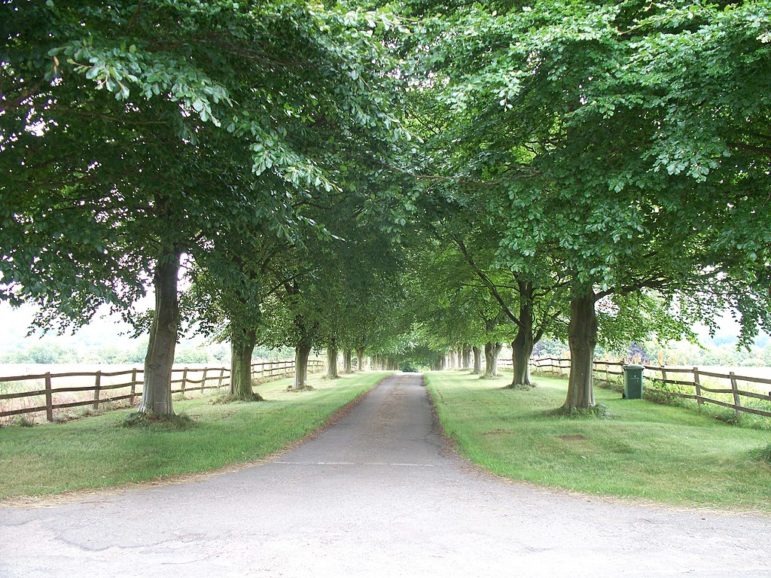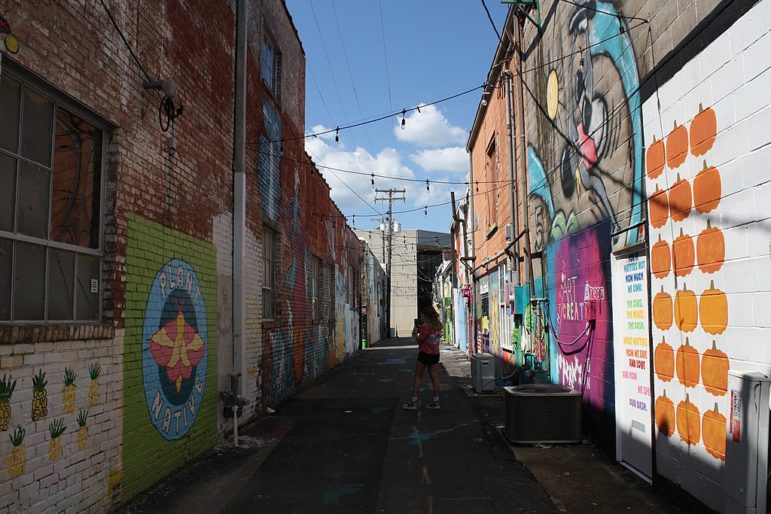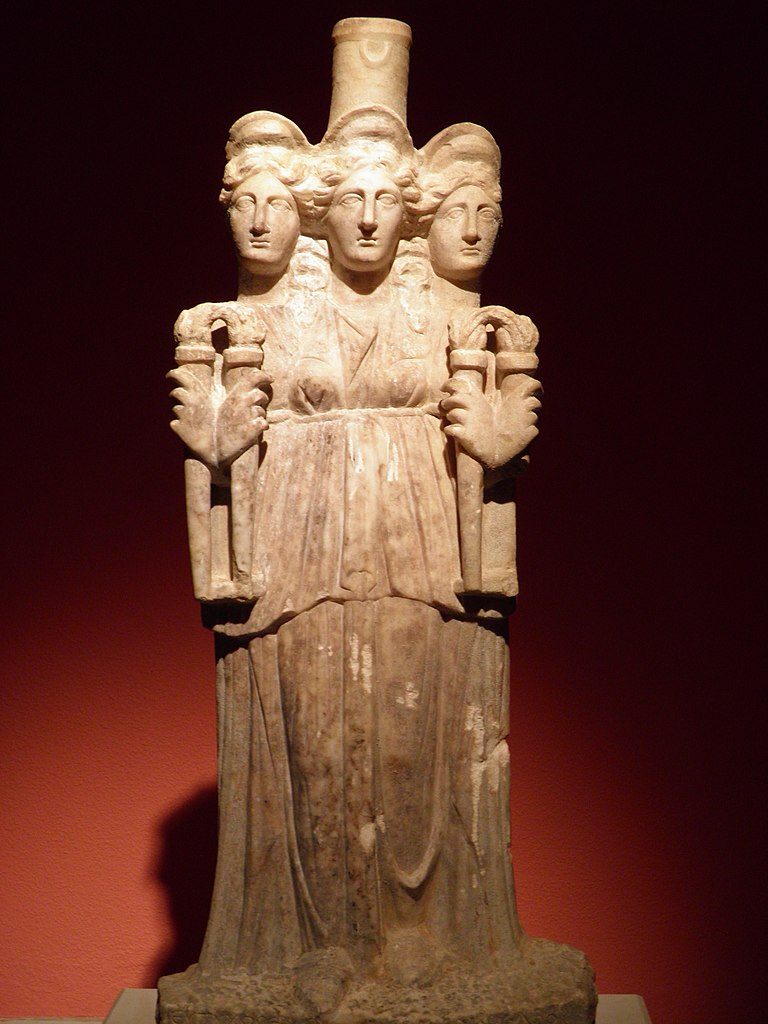
The first time I met a devotee of Hecate, I traveled across the city to visit her altar. This was a while ago, back when a two hour bus ride was just a question of inconvenience and tedium, so it seemed like an interesting Saturday outing. I packed a book and rode the CTA into a residential neighborhood, looking for the stone tripod that had been described to me.
I couldn’t have said exactly why I was doing it, at the time. I had heard about the goddess before, but felt her only once – a surprising sense of her over my shoulder as I talked about magic and hubris. It was more that I liked the idea of a public altar, one that lived in a community that mostly overlooked it, providing only a few with a holy space. It seemed polite to introduce myself, so I bottled up a few coins in a small jar of honey, and I traveled to leave them under the stone, where they might never be noticed by others leaving their offerings.
It was the sort of devotion where the act itself is a simple sort of magic, an offering of time and attention. I expected nothing for it and, as far as I could tell in the moment, got nothing- just a long day of summer transportation, and a quiet moment at the side of the road.

A driveway from Bourton-on-the-Water, England [Michael Dibb, Wikimedia Commons, CC 2.0]
Any article on Hecate – and there are many – repeats that she is the goddess of the trivium, the crossroads with three branches. I knew this for years, taking note of the places where I found these, marking them in my memory. The one not far from my apartment was where I did one of my first pieces of magic – a simple money draw. I seldom keep records of my magic, so all I remember is the moon, and the grate at the center of the crossroads where I could hear the sound of rushing water. The pennies I scattered made no sound, and when I left I did not look back.
She seemed mysterious and vast, the sort of goddess that should be approached with reverence and on her own terms, or not at all. I thought my altar was full already – but the goddess of witches seemed like the sort likely to bless a spell well-researched and carefully performed. I put it out of my mind- but my part of the spell, a stack of old pennies, sits on my windowsill, carefully arranged.
When I thought of her, after that, it was with respectful curiosity. I knew that she was tied to Hermes, and I wondered about them, about the chthonic gods of the Hellenic pantheon whose offerings were meant to go down, below the earth. Occasionally I would leave offerings at the trivium in the nearby graveyard, thinking of her in her role as the goddess of the undead.
She wasn’t one of the goddesses I worked with, I told myself, and so I never did any research. What I knew was almost rumor – UPG shared by other witches, mentions in texts I was browsing. She was unavoidable in pagan spaces, but I never sought her out. What I knew was a collage of stereotypes and specific practice, with just enough context to know that she was bigger, older, and more than I could understand.
What finally drew me in was the rumor – unsourced and unconfirmed – that in ancient Greece the trivium was the place where someone’s driveway met the road.

Art Alley between Arch Ave and Race Ave in downtown Searcy, Arkansas [Brandonrush, Wikimedia Commons, CC 1.0]
I have a lot of respect for research. I’ve written about it before – how my practice is often defined and limited by the need to verify and speak with authority. It’s a rare piece of information that delights me so much that I don’t care if it is true, that speaks to me where I live and offers a road that I want to walk down.
This idea of the trivium was one of those. I am a person who travels – and this notion, linking a goddess so often seen as dark and foreboding to the place where the road starts echoed in every trip I have ever taken. I saw her torch, suddenly, in the porch light, heard her keys in the rattle in my pocket as I walked away from the door. I remembered the first trip I took with a group of witches, offering up smoke and fire at the place where gravel met pavement.
Perhaps most powerfully, for me, I saw her as the goddess of the alley way. I spend a lot of time in alleys, and never more than in the last two years. I have sat in them between long shifts at work, smelling the particular sweet odor of dumpsters full of food. I’ve wandered down them, looking at the architecture and the landscaping that people save for themselves, away from the facade of the streetfront. And I’ve glanced into garages as cars pull out, all of the many places where someone’s home becomes a public space, all of the places in between.
There is nothing strange and unapproachable, to me, about the fear of stepping outside my own door. There is nothing more sacred than the relief of coming back.
There is nothing more sacred, to me, than the relief of stepping outside my own door. There is nothing strange or unapproachable about the fear of coming back.

Statue of Hecate, 3rd century CE, Antalya Museum, Turkey [Carole Raddato, Wikimedia Commons, CC 2.0]
When my friend Fio offered a class on her, and on her link to Hermes, I knew that I had to show up. I even had a perfect offering- a corpse wax candle that I had picked up on my last trip, made from adipocere and soy wax in unspecified amounts. It seemed like the ideal offering for a goddess of ghosts- but when I divined, just to be sure, the message was very clear.
No.
Which was… fine. It was fine. I had days left, before the class, and a magic shop not too far from me. It was maybe a two-hour trip, from door to door, up the train line and down the street. I bought more candles, brought them back, put them in a line to see which ones she wanted.
Actually, the cards said. The first one was fine. What I wanted was the effort.
I burned it during the class, watching the wax bleed and drip across my table. It was a strange, soft wax that burned for hours and had the same melting point as the heat of my hands. When I tried to clean it up, it sank into my skin like a salve.
In class, for the first time in years, I spoke to her again. She came to me as a collage of stereotypes and specific practice- a lake underground, a burial mound, a clear image of snakes glorying in a ray of sunlight. “Are you interested in me,” she asked, “or only in him?” and showed me an image of the blue sky, of wings in the sun.
“I wouldn’t be here if I wasn’t interested,” I said.
She shared her amusement. “The effort is appreciated,” she said. “But it isn’t the point. Nothing you can ever do will be what makes you worthy of love. You are worthy, in yourself. You are enough, even for the gods.”
It was a simple thing. Believing it felt like a fearful first step.
The Wild Hunt always welcomes guest submissions. Please send pitches to eric@wildhunt.org.
The views and opinions expressed by our diverse panel of columnists and guest writers represent the many diverging perspectives held within the global Pagan, Heathen and polytheist communities, but do not necessarily reflect the views of The Wild Hunt Inc. or its management.
The Wild Hunt is not responsible for links to external content.
To join a conversation on this post:
Visit our The Wild Hunt subreddit! Point your favorite browser to https://www.reddit.com/r/The_Wild_Hunt_News/, then click “JOIN”. Make sure to click the bell, too, to be notified of new articles posted to our subreddit.